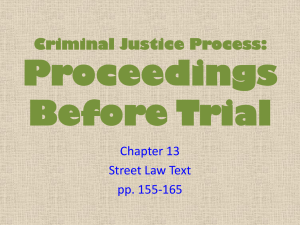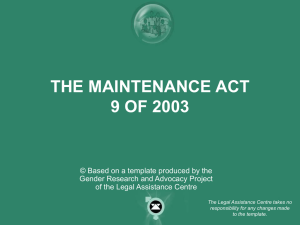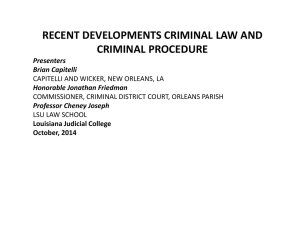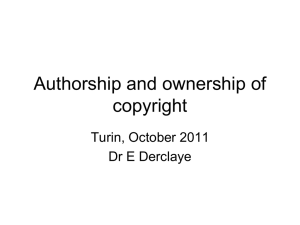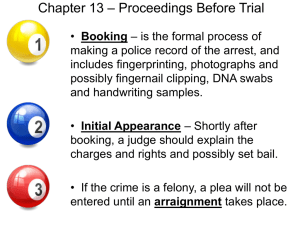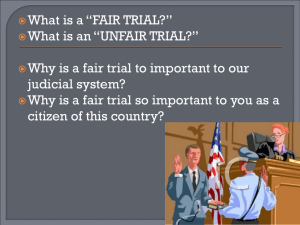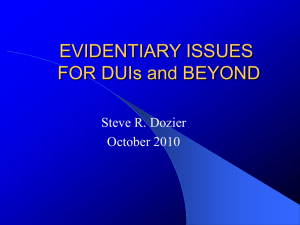The *Wild Bill* Hickok Trial
advertisement
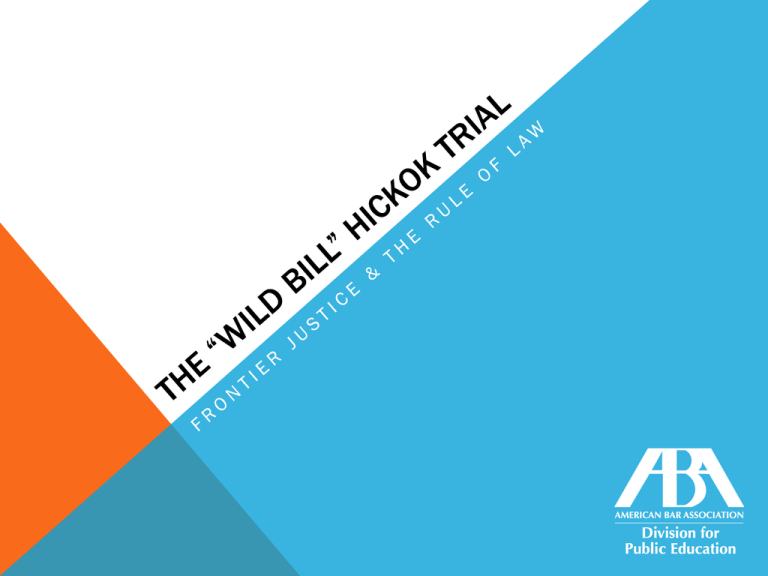
“WILD BILL” HICKOK (1837-1876) DOCUMENT 2 Be it remembered that on the 21st day of July A.D. 1865 information having been given to the subscriber Coroner of Said county that the dead body of Davis K. Tutt supposed to have come to his death by violence had been found at the Court House door in the town of Springfield, on the 21st day of July A.D. 1865. I issued a warrant to the Constable of the township of Campbell requiring him to summon a jury according to law to appear fourthwith at the above mentioned place to examine in what manner and by whom the deceased came to his death. At the time [I also] issued a subpoena for Oliver H. Scott, E.J. Armstrong, L. F. Lee, A. J. Budlong, F. W. Scholter, Thos. D. Hudson, J. W. Orr, [and] W. S. Riggs to appear at the time and place aforesaid. And the said Constable aforesaid at the time and place mentioned in said warrant returned the same that he had Summoned John Hursh, Jay L. French, L. M. Bigbee, Wm. Massey, A. F. Church, [and] John L. Holland to appear as therein required and also that he summoned the Said witnesses to appear as required by subpoena. There upon the said jury appeared at the time and place mentioned and being duly impaneled and sworn proceeded to enquire into the manner and by whom the said Davis K. Tutt came to his death. … Source: State of Missouri v. William Hickok, 1865, Greene County Court, Springfield, Missouri, Missouri Digital Heritage archives. INSTRUCTIONS TO THE JURY The Court instructs the jury: That if they believe from the evidence that Tutt advanced on the Defendant with a pistol drawn, that he had previously made threats of violence to the Defendent which had been communicated to the Defendant, & that Tutt was a fighting character or a dangerous man, there are circumstances from which the Defendant may have had prior cause to believe Tutt intended to do to the Defendant severe great personal injury. That if they believe from this evidence that Tutt advanced on the Defendant with a drawn pistol, and that the conduct of Tutt on this occasion with his general character known to the Defendant was such as to reasonably cause the Defendant to apprehend a design in the part of Tutt to do the Defendant severe great personal injury, & if they believe from the evidence the Defendant had reasonable cause to apprehend [immediate] danger of such design being accomplished at the time he shot Tutt, they will acquit the Defendant. That when danger is threatened and impending, a man is not compelled to stand with his arms folded until it is too late to offer successful resistance, & if the jury believes from the evidence that Tutt was a fighting character, & a dangerous man, & that Defendant was aware such was his character, & that Tutt at the time he was shot by the Defendant was advancing on him with a drawn pistol, & that Tutt had previously made threats of personal injury to Defendant & that Defendant had been informed of such threats & that Defendant shot Tutt to prevent the threatened [impending] injury & that at this time the Defendant shot Tutt, then Defendant has reasonable cause to apprehend Tutt. [That he] intended to do Defendant several great personal injury & that the danger to Defendant was of such design … the jury will acquit … INSTRUCTIONS TO THE JURY … The State asks the Court to instruct the jury: 1. If they believe from the evidence that the defendant intentionally shot at the deceased Davis Tutt—and the death of said Davis Tuff was caused thereby—they will find defendant guilty—unless they are satisfied from the evidence that he acted in self-defense. 2. That defendant is presumed to have intended the natural and probable consequence of his own acts. 5. If the deceased and defendant 11. If the defendant claims to have acted in self-defense it engaged in a fight or conflict willingly on the part of each and the defendant killed the deceased, he is guilty of the offense charged, although the deceased may have fired the first shot. 12. The jury will disregard evidence as to the moral is his duty to satisfy you that he so acted and it is not sufficient to create a doubt in your minds whether he so acted or not. character of deceased and as to his character for loyalty as the character of the deceased could afford no excuse for killing him. 16. That the Jury will disregard any threats made by Tutt against [Hickok] prior to the meeting at the Lyon House in Haycocke’s room. The citizens of this city were shocked and terrified of the idea that a man could arm himself and take a position at a corner of a public square, in the centre of the city, and await the approach of his victim for an hour or two, and then willingly engage in a conflict with him which resulted in his instant death; … That the defendant engaged in the fight willingly is not disputed, and lawyers say— and the Court instructed the jury to the same effect—that he was not entitled to an acquittal on the ground of self-defense unless he was anxious to avoid the fight, and used all reasonable means to do so; but the jury seems to have thought differently. DOCUMENT 5 Source: “Wild Bill,” Harper’s New Monthly Magazine, February 1867 “WILD BILL” HICKOK TRIAL (1865) JOHN S. PHELPS, DEFENSE LAWYER R O B E R T W. F YA N , PROSECUTOR SEMPRONIUS H A M I LTO N BOYD, JUDGE www.sos.mo.gov/mdh/ Howard Kaplan Howard.kaplan@americanbar.org (312) 988-5738 Tiffany Middleton Tiffany.Middleton@americanbar.org (312) 988-5739

